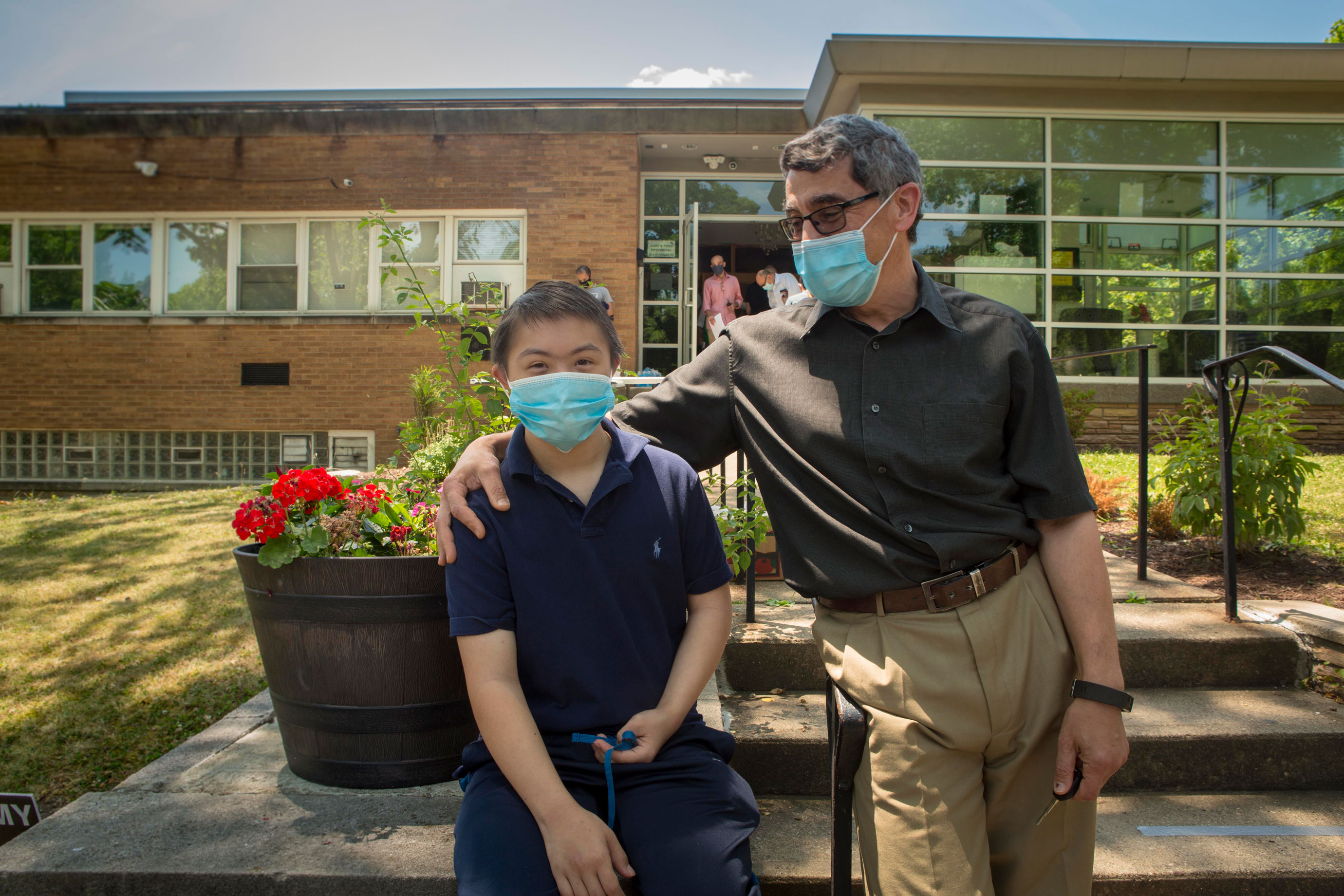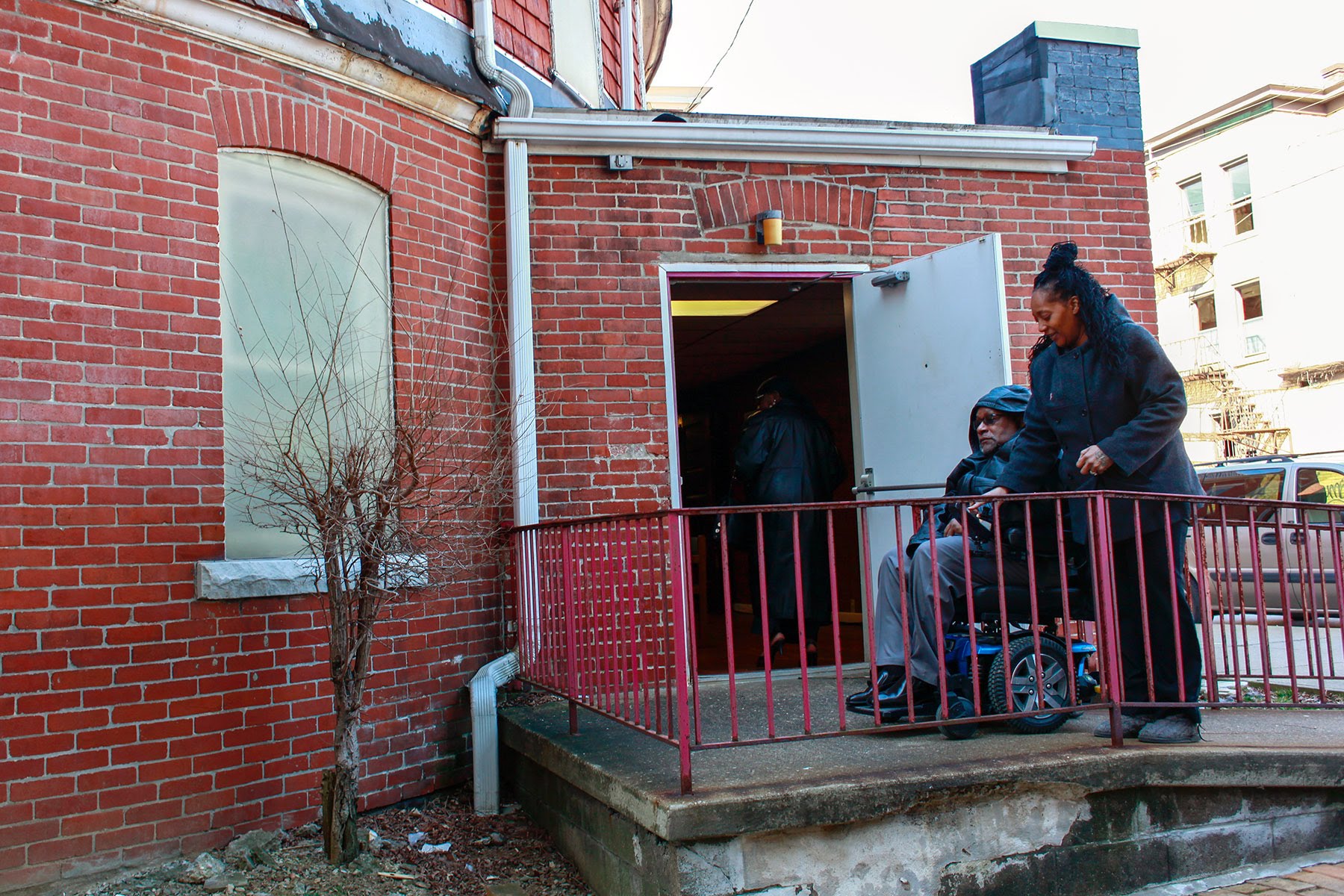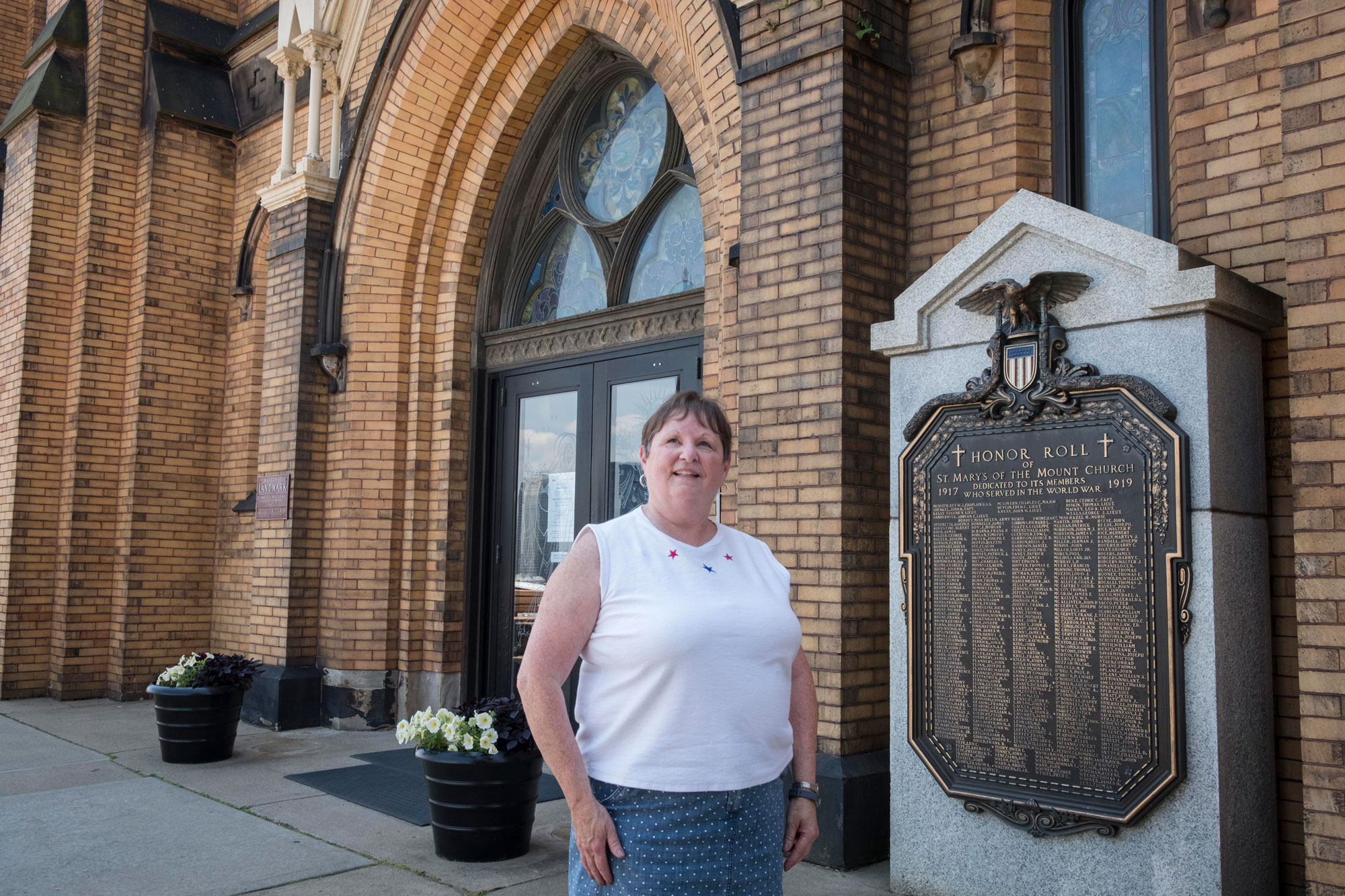Podcast episode 3: Listen to this article’s author discuss how local places of worship are approaching accessibility for people with disabilities.
A coalition of religious leaders successfully lobbied 30 years ago for places of worship to be exempt from the Americans with Disabilities Act [ADA]. Many local faith leaders have since worked to make practices and spaces welcoming for congregants of all abilities, but challenges to accessibility remain.
Despite the ADA’s effect on nearly all areas of public life, religious entities — including churches, synagogues, mosques, religious schools and daycares — are exempt from the ADA. Dozens of Catholic churches cited burdensome costs and religious freedom when lobbying for the exemption.
Three decades later, religious institutions remain exempt from meeting accessibility codes and certain employment standards. Despite the exemption, many congregations across the city are trying to be accessible with varying degrees of success.
PublicSource and Unabridged Press spoke with several local congregations about the accessibility measures they are trying to implement and the areas in which they could improve. The added complexity of the COVID-19 pandemic — which has forced many congregations online — has increased accessibility for some congregants. Though for many people with disabilities, particularly the poor and elderly, online services can be less accessible.
Alaa Shalaby’s son, a 16-year old with Down syndrome, grew up attending the Islamic Center of Pittsburgh [ICP]. Children within the Muslim community who have disabilities are visible and included in the congregation, said Shalaby, a board member at ICP.
“There is no attempt to screen or shield or overprotect,” Shalaby said. “In the kinds of communities most of our members grew up in overseas, they are very family-oriented, almost tribal, you are just accepted.”
Board member Elaine Linn echoed Shalaby’s sentiment. In Egypt, many imams — who lead prayer — are blind, a trait that gives them a special skill in memorizing the holy books, she said. ICP provides the Quran in Braille in its library.

Alaa Shalaby, a board member of the Islamic Center of Pittsburgh, and his son Ramy await afternoon prayers in front of the ICP's building in Oakland. (Photo by Heather Mull/PublicSource)
The needs of congregants with disabilities are woven into the fabric of the ICP community, they said. Though Shalaby wishes the center was more physically accessible; the members do their best with what they have.
“We do have a ramp that gets people into the top floor, and they can attend the prayers,” but the congregation’s social hall is in the basement, only accessible by steps. “We’ve looked into an elevator, but there is concern the building may not be good to retrofit,” Shalaby said. He’s unsure of a solution.
When someone who uses a wheelchair needs to go downstairs, several congregants will carry the individual down the steps, Shalaby said. The solution can be awkward, humiliating and even unsafe.
Along with many congregations across the Pittsburgh region, ICP has been meeting virtually throughout the pandemic. The switch to online worship has presented challenges for the congregation as they adapt to technology they were not using before. But it has also leveled the playing field and provided equal access to services and the Imam.
Linn has enjoyed the benefits of greater access herself. Women typically worship behind men at a mosque, but the remote services have allowed her greater visibility.
“I can raise my hand with a question, and I am not in the back of the room. I have access to (the Imam),” Linn said.
Congregants without cars and those who struggle to get to the mosque have also been able to tune in to the virtual services. Muslim scholars have participated in discussions amid the pandemic and have engaged with the congregants, Linn said. “That is a silver lining,” Linn said.
Pastor Jonathon Counts and his wife are concerned with the accessibility of the Homewood African Methodist Episcopal Zion Church. Founded in 1871, the centuries-old building has many limitations.
“We need an elevator or a chair lift so disabled persons can enjoy the fullness of what our church offers. We also need another ramp as well,” Counts said. “These projects will cost a lot of money, but that is on our vision board to work towards.”
Many houses of worship in the Pittsburgh area exist in buildings that predate the implementation of the ADA. The buildings already lacked the ramps, elevators, bathrooms and other features required in public venues following the act’s passage.
While a 100-year-old church might be completely inaccessible to someone who uses a wheelchair, once the church decides to upgrade any part of the space, 20% of the renovation budget must go toward improving physical accessibility.
Religious entities that choose to undergo renovations are not exempt from the ADA’s accessibility guidelines [ADAAG], or building code, said Bruce Pollock, an architect at RSSC Architecture. The Pittsburgh-based firm specializes in renovating houses of worship.
While a 100-year-old church might be completely inaccessible to someone who uses a wheelchair, once the church decides to upgrade any part of the space, 20% of the renovation budget must go toward improving physical accessibility.
Building owners have discretion in choosing what physical accessibility measures will make up 20% of the budget, according to Pollock. The owners must continue to work toward complying with the code, he said.
“Some get to a point where they’ve done everything but get an elevator in the building, but that would be 40% of their budget, so they will just install the shaft,” Pollock shared. “Next time they renovate, maybe they will get the actual elevator.”
Despite limited funds, Homewood AME Zion Church has committed to paying for ACCESS, Allegheny County’s door-to-door paratransit service, to enable some of their members with disabilities to attend regularly. The Counts also reserve space near the front of the sanctuary for congregants who use wheelchairs to help them feel included rather than relegated to the rear of the sanctuary.

Philip Russell and caretaker Alisa Martin use the wheelchair ramp on the side of the building to enter Homewood AME Zion Church on March 1, 2020. (Photo by Kimberly Rowen/PublicSource)
The church has been working to accommodate congregants with social and emotional disabilities. Counts, along with several parents, have created a sensory room so all families can attend events.
Counts hopes that children “can have a safe space to play as well as work through their triggers.”
Like ICP, the pandemic changed the church’s operations quickly. Counts has created a YouTube channel for the church, hosted Zoom prayer meetings and implemented socially distant visits with congregants. The church is working on safety plans to resume in-person meetings by the end of the summer, but is not yet sure whether that will be possible.
Victory Family Church in Cranberry Township has become a destination for Christian families with disabilities who are seeking a place to worship. The megachurch, which bought land to build the place of worship rather than converting an existing building, was subject to ADAAG guidelines. The space is physically accessible to current standards.
The church also has a special needs ministry called Endless Possibilities that has become well-known within disability circles. Tanya Riggs, who heads the program, has had families from Ohio and other places an hour away travel to attend the ministry’s services.
“I do not ever recall a time we have turned a child away,” Riggs said.
Before a child with disabilities attends a service at Victory Family Church, their parent or caregiver completes an application regarding how the church can best minister to the child’s needs. Parents and guardians must sign up for the service about three days in advance to ensure enough volunteers are present on Sundays.
Some families said the need to R.S.V.P. for the Endless Possibilities service is difficult to do.
“With all of our kids’ needs, I do not have the mental capacity to plan that far ahead,” one parent said.
Riggs said she hopes Victory can continue to adapt to the changing needs of the community.
Through the Endless Possibilities program, many families who have children with disabilities have been able to attend church together for the first time, Riggs said. The church has a dedicated space for children who cannot be integrated into a typical Sunday school classroom, as well as a one-on-one aide program for children who can attend a classroom with support. Victory also offers a SuperMoms support group and strives to have a volunteer with a medical background on hand for congregants with complex medical needs.
Blind and deaf congregants may experience difficulties fully participating in worship. But Karen Shepherd, coordinator of St. Mary of the Mount’s deaf ministry, works with her team to be inclusive.
Sitting atop Mount Washington, St. Mary of the Mount is home to Pittsburgh’s Deaf Choir and the Deaf Council for the Diocese of Pittsburgh. The church, founded in 1897, offers Mass every Sunday in American Sign Language [ASL] and has deaf congregants who serve as ministers at Mass, Shepherd said.
“We have a Deaf Response Leader who leads the prayers and responses of the congregation so that our Deaf members are participating in the Mass,” Shepherd said. “In addition, we have a Deaf Choir that signs the songs that are being sung by the cantor or choir.”

Karen Shepherd, a retired school teacher, has been leading the deaf choir and attending services at St. Mary of the Mount for the past seven years. (Photo by Heather Mull/PublicSource)
COVID-19 has changed the way St. Mary of the Mount provides access to worshippers. The church’s website offers links to interpreted services at other parishes that members have found useful, but it doesn’t have the technology on hand to do online interpretation consistently.
“The resources on our website…are only available for those members of our deaf community who have the technology resources at home to access them,” Shepherd said. “Even those who have internet access and a device on which to view the videos have not had the IT support of their children or grandchildren who advise them and help them navigate the world of streaming.”
The church has recently begun to load the sermon podcast to a voicemail so that people with landlines only can call in and listen. Yet the podcast doesn’t help the deaf community. Transcriptions aren’t available.
‘Where the whole family fits in’
Even when houses of worship work to accomodate people with disabilities, some individuals are still left out.
Aimee and Steve Robeson of Butler County attended a special needs program for their 10-year old son, Christian, for several years. Christian has multiple medical and cognitive disabilities, and the program provided an hour of respite for his parents each week.
As his needs have evolved, it’s been more difficult for Aimee and Steve to feel confident leaving Christian in a church setting. Aimee is considering switching to a local church that is smaller and will provide Christian with a one-on-one aide. Sunday school classrooms can be too stimulating for him.
The family thinks they have found a new place to worship together, a church that was suggested by a teacher at Christian’s school who knows him and his needs well. They’ve also begun to meet with a small group of parents for Bible study and have felt encouraged.
Congregations may not be able to accomodate all disabilities and unique needs, Aimee said. But open lines of communication and a willingness to adapt are key.
“Even though the other kids are ‘normal,’ they still interact with Christian and like being with him,” Aimee said.
That sense of acceptance and friendship for Christian is what the family is craving — sometimes even over a highly-formulated program.
Congregations may not be able to accomodate all disabilities and unique needs, Aimee said. But open lines of communication and a willingness to adapt are key.
“We haven’t honestly been to church in a year, between [Christian’s] changing needs and the pandemic,” Aimee said. “A lot of it, too, is finding a place where the whole family fits in, and that’s the hardest part.”
Meg St-Esprit is a freelance journalist based in Bellevue. She can be reached at megstesprit@gmail.com or on Twitter @megstesprit.
A note from this story’s adviser:
Within the realm of the human spirit, we all strive for unconditional acceptance and belonging. It is when an apparent disability becomes a piece of that human that challenges appear and can present themselves as potential problems. A number of people have difficulties asking others for any kind of help or assistance. And, when we physically and emotionally can be present, where all potential barriers and challenges have been fully thought out and overcome beforehand, that is when we can successfully move forward in faith that we are all accessible, accepted and welcome without question and we do belong.
—Brian Rutherford, accessibility advocate and audio description coordinator